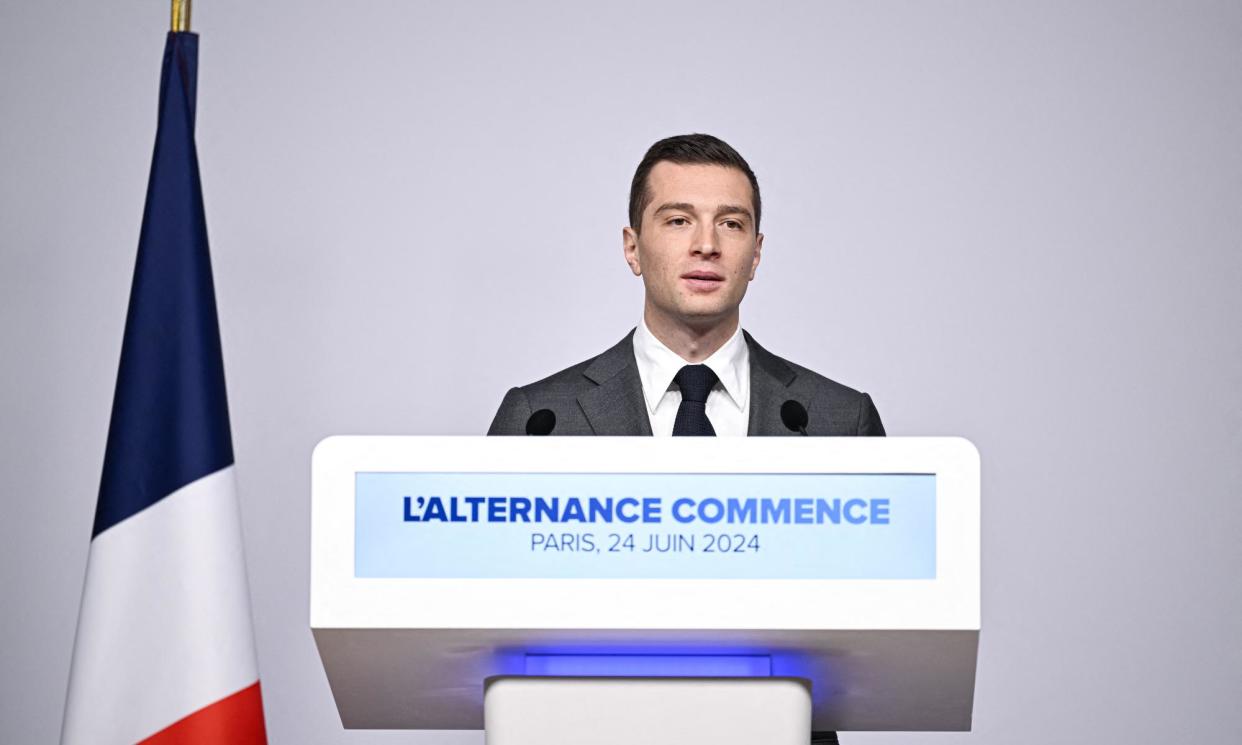Far-right National Rally promises to bar dual nationals from some state jobs in France

The far-right National Rally’s pledge to bar dual nationals from certain state jobs in France has been criticised by the left and centrists who say it is a taste of broader discrimination that could be implemented if the party comes to power in snap elections.
Jordan Bardella, who aims to become prime minister if the party wins an absolute majority in parliament on 7 July, announced this week that people with dual nationality would be excluded from “the most strategic posts of state”, which would be reserved for French citizens. In a proposal that rang alarm bells, he said it would apply to strategic security and defence positions.
Marine Le Pen, who will run for president for the anti-immigration party National Rally (RN) in 2027, said on Tuesday it was “really only a handful of jobs” in “sensitive strategic posts”. She said there would be a list published that could be regularly amended according to “geopolitical problems”.
The interior minister, Gérald Darmanin, told Europe 1 radio that sensitive jobs in France were already vetted in a number of ways and this was unnecessary and amounted to “dividing the nation”. He said: “I don’t like this way of filtering the French”. He said it would discredit “3 million French-Americans, French-Algerians, French-Portuguese, French Moroccans …”.
The left said that the symbolic measure showed an intention to sort people by nationality, background or culture. They pointed to a proposed law published by Le Pen in January, when she was an MP, in which she suggested a constitutional change to prevent dual nationals from accessing jobs in state administration, state companies and public service missions.
Jean-Philippe Tanguy, who is running for re-election for the RN, told France Inter radio on Tuesday there was no measure defended by Le Pen or Bardella “that refers to people in terms of their religion on presumed origins”. Asked about Emmanuel Macron’s comments that the RN and the leftwing New Popular Front alliance risked bringing “civil war” to France, he said the comments were “completely surreal”.
Macron called a snap election this month when his centrists were trounced by the RN in European elections. Current polling shows Le Pen’s party could take the greatest number of seats in parliament, followed by the left, but it is uncertain whether they would be able to reach an absolute majority or face a hung parliament.
The former Socialist education minister, Najat Vallaud-Belkacem, who has dual French and Moroccan nationality, published an open letter to French people in Le Monde on Tuesday.
She wrote: “Like many of you, I’m living with the pain and anguish of this serious and uncertain electoral period. I’m addressing all the French people who will never be French enough for the RN: those who have obtained French nationality, those who are dual nationals … those born and living in France for decades, children of immigrants, French from overseas [territories], who never have the right first name, the right religion, the right skin colour for the far right. Today, we more than ever have a target on our backs.”
She wrote: “In power, the RN, which has never hidden its hatred towards those it calls ‘French on paper’, will rush to ban us access to jobs that it judges too good for us: in state administration, in public companies and state missions.”
She said Le Pen’s proposed law in January that barred dual nationals from some public jobs amounted to “the refusal to see the children of immigrants in public positions”.
Bardella recently sought to reassure a caller during a phone-in on BFMTV saying his party had been unfairly “caricatured” and that “French people of foreign origin” who “work and respect the law” had nothing to fear.
His use of the expression “French people of foreign origin” was seized on by opponents. The French constitution does not distinguish between French people – whether they are French by birth, are dual national, or obtained nationality as an adult after living and working in France. All are the same in the eyes of the law. The exact number of dual nationals in France is not known because it is not a question asked in the census. It is estimated to be between 3.3 million and 5 million people.
The RN also intend to scrap nationality rights for children born and raised in France by foreign parents.
Pierre Ouzoulias, a Communist senator, wrote on X that the idea of barring dua nationals from certain jobs showed the RN had an “ethnic vision of the nation that distinguishes good and bad French people according to their origins”.

 Yahoo News
Yahoo News 
